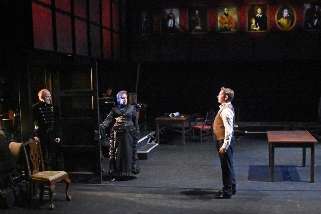|
Back
Britten Comes Out as a Pacifist New York
GK Arts Center
05/09/2019 - & May 10, 11, 12, 2019
Benjamin Britten: Owen Wingrave, opus 85 (orchestration David Matthews)
Robert Balonek*/Michael Weyandt (Owen), Matthew Curran*/Daniel Klein (Spencer Coyle), Bernard Holcomb*/Daniel Curran (Lechmere), Emily Pulley*/Tracy Cox (Miss Wingrave), Janice Hall*/Amelia Watkins (Mrs. Coyle), Mary Ann Stewart*/Beverly O’Regan Thiele (Mrs. Julian), Katherine Pracht*/Augusta Caso (Kate), Rufus Müller*/Brian Downen (General Sir Philip Wingrave, Narrator)
Maggie Lauer (Flute), Michelle Farah (Oboe), Katie Curran (Clarinet), Gilbert Dejean (Bassoon), Tim McCarthy (Horn), Chris Scanlon (Trumpet), Roger Verdi (Trombone), Charles Kiger, Yuri Yamashita (Percussion), Catherine Miller (piano), Laura Frautschi, Laura Bald (Violin), Yumi Oshima (Viola), Luke Krafka (Cello), Scott Ritchie (Double Bass), Richard Cordova (Conductor)
Philip Shneidman (Director), Josh Smith (Scenic and Lighting Designer), Lara de Bruijn (Costume Designer), Alex Basco Koch (Projection Designer)

R. Müller, J. Hall, R. Balonek (© Tina Buckman)
Owen Wingrave is Benjamin Britten’s only opera that touches on a matter close to his heart, pacifism. Britten had left Britain in 1939 and come to America, but did not find this country any more sympathetic to his pacific point of view than his homeland and returned to Britain in 1942. Based on a Henry James story, which Myfanwy Piper transformed into a libretto, the young Wingrave decides to buck tradition. He refuses to embark on an army career, the profession proscribed for male Wingraves for three hundred years. It is ironic that his act of defiance displays the military posture and soldier’s spine undoubtedly expressed in his genes.
A first rate setting created by Josh Smith combines the living room of his tutor, Spencer Coyle, the sitting room of a spinster Aunt, and the living and dining rooms of Paramore, the family seat. Imposing portraits of a long line of military heroes in the Wingrave family hang high over the rear of the set. At the top of the stairs is a room in which one relative is supposed to have killed his young boy, because the boy had been behaving like a sissy in the playground.
Wingrave first confesses his radical decision to his tutor, the curiously sweet Coyle, who Matthew Curran captures in song with a brisk authority and also with compassion for the young man who is challenging the family tradition of military service for which Coyle is prepping him. Curran gradually reveals a sexual undercurrent which flows out to Owen. Both Coyle and his wife are attracted to this fine young man.
Three female figures are as hostile and unsympathetic to Owen’s declaration as his doddering grandfather, sung by Rufus Müller in tones full of fury and disgust. The condemnatory weight of family, the power of which remains only in an old general, is frightening, but does not derail the soldier in Owen. It is a classic “coming out.” James’ irony shines through: Owen embraces peace only to die. He is a perfect soldier, faithful to his beliefs and committed to peace.
Robert Balonek sings the role of Owen with increasing conviction as the story unfolds. Only a trip to the family seat can disabuse him of his ridiculous defiance. When Owen arrives at the family estate, Paramore, the family makes its last stand. Even in the presence of more than ten ancestors glaring down at him from their portraits, he is convinced that war is not for him. His great-great grandfather may stir on the canvas and heave as Owen approaches. We know that Owen feels their presence. We also know he will not yield. Owen is roused to sing his “pacifist” aria particularly poignantly, even though the gamelan which Britten had written in was absent from the orchestra. Touches of the East are often used by Britten to suggest truth and goodness. The classic triads also suggest Owen’s beneficent spirit.
Katherine Pracht delivers a nuanced Kate, the woman who would marry Owen. She is frank as she sings of her need to marry a man who has position. She has always assumed she would live at Paramore. Owen has been banished.
At the end, Owen dies after he is goaded by Kate to be locked into a haunted room of the family mansion (at the top of a flight of stairs). Unlocking the door, Kate finds him sprawled on the floor like a soldier felled on the battlefield. A steering screech fills the house. Owen is dead.
Owen often sings in a classic triad from a scale, which in Britten symbolizes truth and self-determination seems fruitless because there is always a ghost. The lyricism of this piece, punctuated with an army’s drum beats and horns, suggest the varied textures of the story, Owen’s pride and the family’s fury. Yet the opera feels like Owen (and Britten) are on the right track. So too was this production by the the little OPERA theatre of ny.
Susan Hall
|